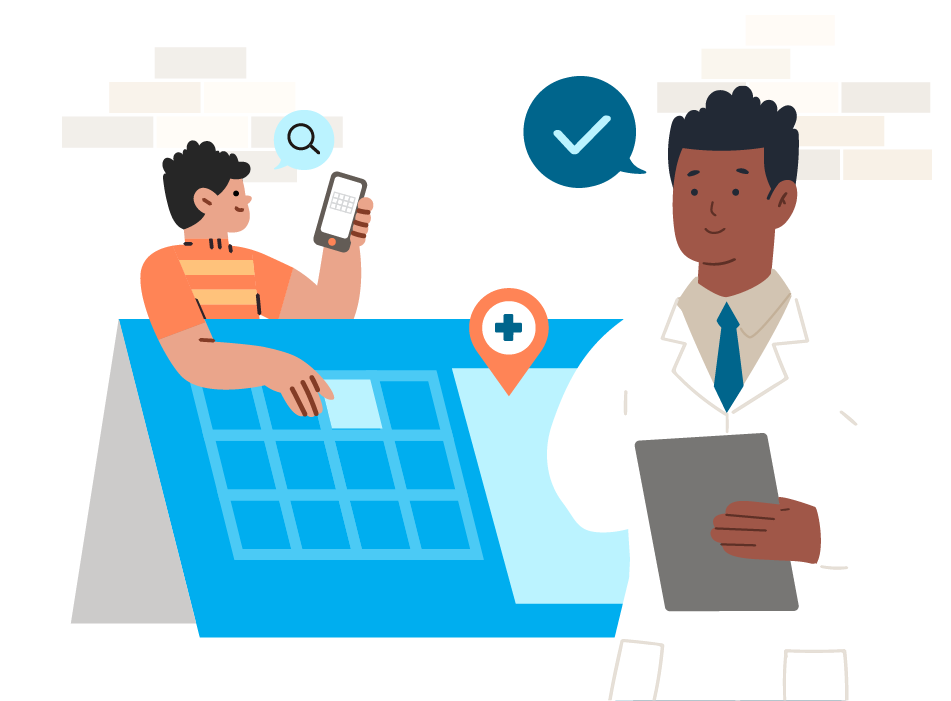
Meet Patient Expectations for Consumer-level Access
Published by Patty Riskind, CEO of Orbita on
Jan 16, 2023 9:00:00 AM
Patients want a healthcare experience that mimics the convenience they enjoy in other areas of their lives – finding information through predictive search on Google, for instance, or scheduling an appointment as easily as they make dinner reservations on OpenTable.
Unfortunately, healthcare falls short. Few provider websites offer a true “digital front door,” with intuitive ways to find care or accurate information.
Case in point: In December, my PCP asked me to schedule lab services. I did what any 21st century consumer would do: I went to my hospital’s website to locate a lab and schedule an appointment.
Not helpful at all. I couldn’t find a convenient location, much less make an appointment. Ultimately, I simply showed up at the hospital, hoping they could fit me in. Luckily, they did – but that’s not how it should work. In health care, we throw up barriers, so it’s nearly impossible for patients to readily find information and care. And because they can’t, overburdened staff must complete tasks that could be easily handled through automation.
Orbita is fixing this problem with our advanced Access Navigation solution, an innovation that marries the utility of online consumer experiences and the convenience of a healthcare-specific virtual assistant. The result? Leveraging conversational and generative AI, we’ve developed an interactive virtual assistant to improve patient access. Representing the next generation of the digital front door, our virtual assistant triggers hyper-personalized dialogs to pose questions and probe for details to ensure patients find what they’re looking for.
Unfortunately, healthcare falls short. Few provider websites offer a true “digital front door,” with intuitive ways to find care or accurate information.
Case in point: In December, my PCP asked me to schedule lab services. I did what any 21st century consumer would do: I went to my hospital’s website to locate a lab and schedule an appointment.
- I typed “lab services” into the search bar – and was instantly overwhelmed with a laundry list of hundreds of labs across Chicago-land.
- Needing something close to home, I added “near me” and my ZIP code to the search – and was presented with the same confusing list as before.
Not helpful at all. I couldn’t find a convenient location, much less make an appointment. Ultimately, I simply showed up at the hospital, hoping they could fit me in. Luckily, they did – but that’s not how it should work. In health care, we throw up barriers, so it’s nearly impossible for patients to readily find information and care. And because they can’t, overburdened staff must complete tasks that could be easily handled through automation.
Orbita is fixing this problem with our advanced Access Navigation solution, an innovation that marries the utility of online consumer experiences and the convenience of a healthcare-specific virtual assistant. The result? Leveraging conversational and generative AI, we’ve developed an interactive virtual assistant to improve patient access. Representing the next generation of the digital front door, our virtual assistant triggers hyper-personalized dialogs to pose questions and probe for details to ensure patients find what they’re looking for.
- Patients can use language familiar to them – “I need a foot doctor near my office that takes Aetna” – and get accurate responses that are easy to understand.
- Orbita helps guide patients to the appropriate care setting based on the symptoms they share and the urgency of their need (telehealth appointment? next-day office visit? trip to urgent care or the ED?).
- Patients can schedule an appointment directly from the virtual assistant – no more telephone tag – and at their convenience (whether during or after business hours).
- Greater efficiency and lower costs because Orbita automates routine tasks
- Better employee satisfaction (which translates to less turnover) because they spend more time with patients that genuinely need their help and expertise
- Reduced leakage (and capturing associated revenue) that occurs when patients are dissatisfied and seek care elsewhere
- Improving the patient experience, satisfaction and loyalty in today’s highly competitive market (you can bet Amazon and Walgreens, which have recently entered the retail health market, will offer a great consumer experience!)
Learn more about Orbita Access Navigation here. And in the meantime, consider these statistics:
- 50% of patients say one bad digital experience ruins their entire interaction with a provider;
- 78% of people who said they switched providers in 2021 did so because of poor healthcare navigation;
Want to learn more about what patients expect from your website and other digital tools? Click here to read some eye-opening statistics.

